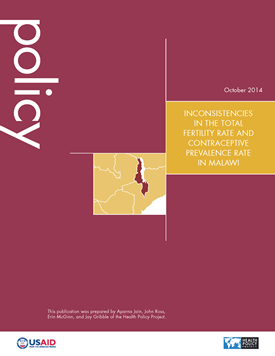The Health Policy Project ended in 2016. Work continued under Health Policy Plus (HP+) until 2022.
PUBLICATION
Author(s): Aparna Jain, John Ross, Erin McGinn, Jay Gribble
Primary Language: English
Date: 10/15/2014
Abstract:
Two commonly used measures of population policy effectiveness and family planning programs are the total fertility rate (TFR) and the contraceptive prevalence rate (CPR). Over the past 18 years in Malawi, CPR increased dramatically from 13 percent in 1992 to 46.1 percent in 2010 among reproductive-age women in union. Surprisingly, this dramatic increase in CPR resulted in only a modest decline in TFR from 6.7 to 5.7 births per woman in the same period. According to international correlations, the increase of 33 points in CPR would have lowered TFR by 2 births.
This study, conducted by the USAID-funded Health Policy Project (HPP), uses available data from the Demographic and Health Surveys (DHS) to explore why the rise in CPR has not translated into significant reductions in TFR in Malawi. It employs the Proximate Determinants of Fertility Model developed by Bongaarts to estimate TFR at the national level, and urban and rural levels in 2000, 2004 and 2010. The observed (as calculated from DHS data) and estimated (as calculated by HPP) TFR values are compared and explanations of any differences are explored.
Family Planning/Reproductive Health (FP/RH) Modeling Malawi


